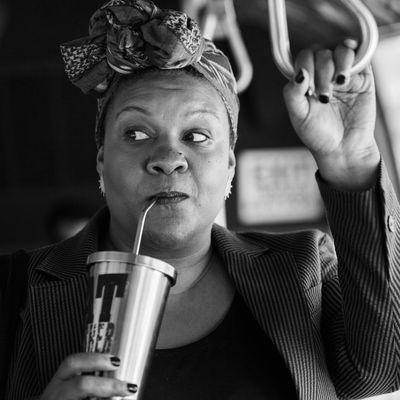
Radha doesn’t set out to assault the producer-king of the New York theater scene early in The Forty-Year-Old Version. It just kind of happens at a cocktail party. Radha — played by Radha Blank, the film’s writer, director, producer, and star — is a playwright whose career has stalled out after a promising start, and J. Whitman (Reed Birney) is a guy who gets things on stage. He’s an unctuous type who’s built a career off art that’s serious enough to make the upscale white audience he caters to feel like they’re seeing something important but that’s in no danger of making that audience feel uncomfortable. He’s also the only game in town for Radha, at least when it comes to getting paid, and so she attempts to smile while he tells her that he found her new play about Harlem gentrification a little inauthentic, lacking in “darkness.” “I asked myself, did a Black person really write this?” he chuckles. But it’s when he tells her he still needs a writer for his Harriet Tubman musical that she feels the need to try to wrap her hands around his bow-tied neck, right there at the open bar, as though she could stop the sounds coming out of his mouth by force.
The Forty-Year-Old Version is a likably diffuse movie about an artistic crisis intersecting with a midlife one, though its log line is catchier than that. It’d go something like this: On the cusp of a big birthday, a struggling New York City playwright decides to reinvent herself as a rapper. There’s a slyness to its elevator-pitch efficiency that’s paralleled in the way its main character has had to get in the habit of summarizing her work for various would-be funders. “Fortyish woman embarks on a hip-hop career” is an underdog story, the kind of quirky crowd-pleaser that gets picked up at Sundance — which is where Netflix bought Blank’s debut not long after its premiere. The reality of the movie is significantly more rueful and less easily condensed. It’s about someone who feels like the choices open to her are to struggle forever or to make work she’s ashamed to put her name on. To make, as she puts it, “poverty porn,” popping the p’s a little, until they feel percussive, and until a rhyme forms around the phrase that she wants to speak into a mic: You regular Blacks are just such a yawn / If I want to get on, better write me some poverty porn.
Radha isn’t bad at rapping, but she isn’t the kind of instant phenom that record execs are going to be chasing down. Her initial defensiveness about her own credibility aside, there’s a purity to the musical efforts she starts recording at the Brownsville apartment of a taciturn dreamboat of a producer named D (Oswin Benjamin), who in his persistence is the film’s most fanciful creation. She’s making something for herself, in contrast to the collaboration she embarks on with Whitman (despite the party incident), making humiliating changes to her play that include inserting a white character and, yes, a hip-hop number. Blank has a Gen-X sensitivity about commercial compromise, complicated by an awareness that it means something different when you’re also the only Black woman in the room. When Radha’s agent and childhood bestie Archie (Peter Kim), who’s more willing and able to bend to the realities of the industry, tells her, “You are not above being a sellout,” she spirals out, enraged at the unfairness of his words and the fact that he might be right.
That friendship, which stretches back to Radha bearding for Archie at their high-school prom, is sweet and a little underdeveloped. The Forty-Year-Old Version, which draws from Blank’s own experiences in New York theater, keeps multiple story threads going, some of which are more explored than others. The kids in the writing class Radha teaches could be a movie to themselves, a raucous, enthusiastic, frequently inappropriate bunch with a tendency to turn up at her events. Another, involving the death of her artist mother a year ago and her ongoing mourning, is really just a bookend. This is a first film, and it has the overflowing quality of one made by someone intent on getting all of her best ideas in there in case she doesn’t get another chance. That’s not, ultimately, such a bad thing. Shot in black-and-white with occasional accents of color, and given to camera-facing testimonials from characters around Radha’s neighborhood in a nod to Spike Lee, The Forty-Year-Old Version feels like a ’90s indie throwback, loose and left raw at the edges, marked by an intimacy that can only come from drawing from the stuff of its multi-hyphenate creator’s life. With that intimacy come moments of painful realness, like when Radha, asked to introduce herself on arriving at D’s place, pulls out what has to be a name from her high-school days — RadhaMUSPrime. Then, as if unable to help herself, she does an awkward, hilarious Transformers impression — because as Blank understands, even if Whitman doesn’t, darkness isn’t the only way to achieve authenticity.
More Movie Reviews
- The Thriller Drop Is a Perfect Addition to the Bad-First-Date Canon
- The Accountant 2 Can Not Be Taken Seriously
- Another Simple Favor Is So Fun, Until It Gets So Dumb


